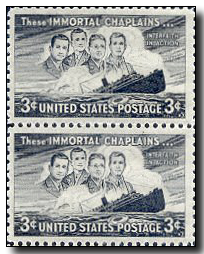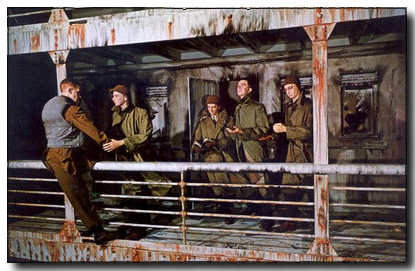No Greater Glory
- CHARLES COLSON
The troop ship glided across the icy waters of the North Atlantic, headed for Greenland. On board, nine hundred soldiers enjoyed an amateur night program organized by the ship's four chaplains.
 |
But in the darkness, a deadly enemy followed them: a German U-boat. It was February 3, 1943. The ship was the Dorchester, and her four chaplains would soon unite in a famous act of heroism.
The oldest chaplain was George Fox, a Methodist minister who insisted on serving despite lingering wounds from the First World War. Rabbi Alex Goode, at age 31, was the youngest chaplain, a brilliant scholar who dreamed of universal brotherhood. Chaplain Clark Poling was the son of a famous radio evangelist. As he left home, Poling said, "Pray, Dad, that I shall never be a coward." Poling then kissed his pregnant wife and young son goodbye.
Finally there was Father John Washington who grew up in a poor Irish family. A childhood brush with death had led him to give his life to serve as a priest in the church.
The four, who had become friends during chaplain training, were delighted to meet up on the Dorchester. All four were loved by the men for their spiritual strength and sense of humor.
At 12:55 A.M., a torpedo ripped a huge hole in the Dorchester's starboard side. As Dan Kurzman writes in his book No Greater Glory, "The four chaplains leaped from their bunks determined to save as many men as possible Perhaps this is what God had primed them for. They were finally in the battlefield, and their souls would be severely tested."
 |
Post
card depicting "The four heroic chaplains of World War II, who gave their lives
and gained immortality when the 'SS Dorchester' was torpedoed and went down off
Greenland, February 3, 1943." |
The four persuaded frightened men to climb down a rope to a lifeboat. One terrified soldier shouted, "I can't find my life jacket!" Chaplain Fox replied, "Here's one, soldier," and handed him his own. When Chaplain Goode realized a sailor had forgotten his gloves, he pulled off his and handed them over. The sailor who spent the next eight hours trying to keep from being swept out of a lifeboat later said, "I owe my life to those gloves."
The chaplains continued to minister to the men in the moments before they died. Pfc. William Bednar, floating among dead comrades, heard the chaplains preaching courage as the ship went down. "Their voices," he said, "were the only thing that kept me going."
As the ship sank, the chaplains linked arms and prayed in English, Hebrew, and Latin.
Those who survived the sinking never forgot the four chaplains, and today Veterans Day we ought to make sure our children know the story of the four heroic men who loved each other like brothers and formed an ecumenism of the trenches. We should remember their example as we face our own battles cultural battles that we will win only if we are willing to put aside our theological differences and join forces. We should remember them as we pray, especially this Veterans Day, for our troops on the ground and in combat right now in Iraq and for the chaplains who serve them.
Most of all, whenever we find ourselves thinking we have sacrificed enough in our all-too-comfortable lives, we ought to remember the four chaplains whose heroism reminds us that "greater love hath no man than this that a man lay down his life for his friends."
For further reading and information:
Dan Kurzman, No Greater Glory: The Four Immortal Chaplains and the Sinking of the Dorchester in World War II (Thorndike, 2004).
BreakPoint Commentary No. 031111, “ The Promise of Our Country: Making Patriots.”
Charles Colson, “ The Message of Private Ryan ,” Wilberforce Forum.
Albert Mohler, “ Those Who Died for Freedom’s Cause ,” BreakPoint Online, 28 May 2004(reprinted from Crosswalk.com).
Marshall Manson, “ Generations of Heroes ,” Townhall.com, 10 November 2004.
William
Bennett, Why We Fight (Doubleday, 2002).
 This is J. Fraser Field, Founder of CERC. I hope you appreciated this piece. We curate these articles especially for believers like you.
This is J. Fraser Field, Founder of CERC. I hope you appreciated this piece. We curate these articles especially for believers like you.
Please show your appreciation by making a $3 donation. CERC is entirely reader supported.

Acknowledgement
Charles Colson. "No Greater Glory." BreakPoint Commentary #041111 11/11/2004.
The Author

 Charles Colson (1931-2012) was an Evangelical Christian leader who founded Prison Fellowship and Breakpoint. Prison Fellowship has flourished into a U.S. ministry of 50,000 volunteers and has spread to more then 50 countries. Beyond his prison ministry, Colson was a Christian author, speaker, and commentator, who regularly confronted contemporary values from a biblically informed perspective. He wrote 15 books, including The Faith: Given Once, For All What Christians Believe, Why They Believe It, and Why It Matters, God & Government, Loving God, Answers to Your Kids' Questions, The Line Between Right & Wrong: Developing a Personal Code of Ethics, Against the Night: Living in the New Dark Ages, and How Now Shall We Live: A Study Guide.
Charles Colson (1931-2012) was an Evangelical Christian leader who founded Prison Fellowship and Breakpoint. Prison Fellowship has flourished into a U.S. ministry of 50,000 volunteers and has spread to more then 50 countries. Beyond his prison ministry, Colson was a Christian author, speaker, and commentator, who regularly confronted contemporary values from a biblically informed perspective. He wrote 15 books, including The Faith: Given Once, For All What Christians Believe, Why They Believe It, and Why It Matters, God & Government, Loving God, Answers to Your Kids' Questions, The Line Between Right & Wrong: Developing a Personal Code of Ethics, Against the Night: Living in the New Dark Ages, and How Now Shall We Live: A Study Guide.


